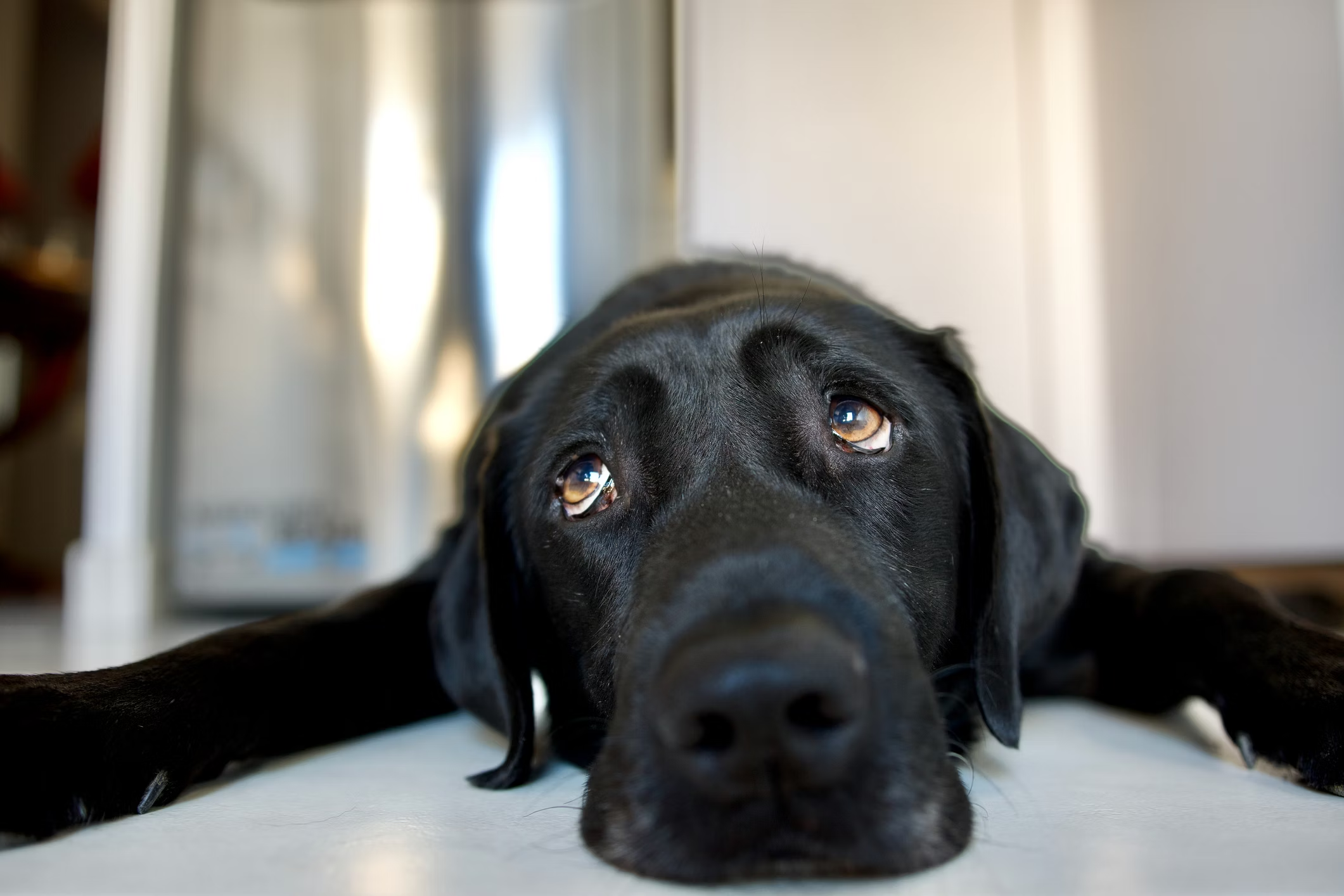Having a gassy dog can be an unpleasant experience. And while occasional flatulence is normal, excessive gas can be a sign of an underlying issue. The best way to help your pup—and spare yourself from unwelcome smells—is to understand what’s causing the gas, what you can do to relieve your dog, and when to seek advice from your veterinarian.
What is flatulence in dogs?
Before we get into possible causes for gas, it’s important to understand what flatulence is. At its most basic level, flatulence occurs when a dog has excessive gas in their stomach, which they expel through their bottoms. Sometimes this expulsion makes a noise, while other times it’s silent. It can have an unpleasant odor or no smell at all. Dogs may experience mild discomfort when they are flatulent or they might not be bothered by it at all.

What causes gas in dogs?
There are many reasons a dog might experience gas. Some causes are minor and don’t require any action, while others can be serious and warrant a trip to the vet for further evaluation. Following are some typical causes and steps a pet parent should take to alleviate the issue.
Diet and food sensitivities
One of the most common culprits behind a gassy dog is the food they eat. Diets that contain ingredients that are hard to digest can cause your dog to produce more gas. Examples of foods to watch out for are ones high in fiber (like soybeans and peas), fat, or dairy. Spicy foods or foods that have spoiled can also cause excess gas. And cruciferous vegetables, such as broccoli and cauliflower, can be associated with flatulence.
Swallowing air
Dogs that eat too quickly often swallow a lot of air along with their food, which can contribute to gas. This is especially common in breeds known for their hearty appetites, like Labrador Retrievers. Using a slow feeder bowl can help reduce the amount of air your dog swallows while eating.
Flat-faced breeds like Pugs, Boston Terriers, French Bulldogs, and Lhasa Apsos, are prone to swallowing more air when they eat or drink, and thus, might be more gassy than other breeds.
GI issues
Various GI diseases can cause gas and other signs of GI issues in dogs. These include:
- Irritable Bowel Syndrome (IBS): a chronic condition characterized by episodes of stomach pain and abnormal bowel movements. Signs include gas, diarrhea, and bloating, often triggered by stress or diet changes.
- Colitis: an inflammation in the colon, often resulting from infections, parasites, or dietary indiscretion. Signs include gas, diarrhea with mucus or blood, and frequent, painful bowel movements.
- Inflammatory Bowel Disease: a chronic inflammation of the intestines due to an abnormal immune response. Symptoms include chronic gas, diarrhea, vomiting, and weight loss.
- Pancreatitis: an inflammation of the pancreas, often caused by eating high-fat foods (like table scraps). Signs include severe abdominal pain, vomiting, diarrhea, and gas.
- Intestinal parasites: parasites such as roundworms or giardia can enter the digestive tract and disrupt normal digestion. Symptoms include gas, diarrhea, vomiting, and weight loss.
Feeding a high-quality diet, regular veterinary check-ups, and keeping your dog’s vaccinations up-to-date can help prevent some of these problems.

When to see a veterinarian
Recognizing the signs of dietary or GI issues in dogs is crucial for early intervention and treatment. In addition to gas, common signs to look out for include:
- Excessive gas and bloating
- Vomiting
- Diarrhea or constipation
- Loss of appetite
- Abdominal pain
- Lethargy
If your dog shows any of these signs, it’s important to consult your veterinarian.
What to give dogs for gas
When it comes to gas relief for dogs, there are several options you can consider. Depending on the cause of the gas, dietary changes may be beneficial. Switching to a high-quality, easy-to-digest dog food, or a diet specifically formulated for dogs with sensitive stomachs, can make a difference. Your veterinarian may also recommend prebiotics, probiotics, and digestive enzymes to aid digestion and reduce gas.
Over-the-counter medications, like antacid, can help reduce gas. However, it’s important to consult with your veterinarian before giving your dog any medication.
Preventing future GI issues
Minimizing gas in dogs often involves a combination of diet management, regular exercise, and routine veterinary care. Here are some tips to keep your dog’s digestive system healthy:
- Feed a balanced, high-quality diet
- Avoid giving your dog table scraps or foods known to cause gas
- Ensure your dog eats slowly, using a slow feeder if necessary
- Keep your dog active and at a healthy weight
- Schedule regular check-ups with your veterinarian
Final thoughts
Understanding what causes gas in dogs and how to prevent it can help ensure they (and you) remain happy and comfortable throughout their lives.
Additional resources:














